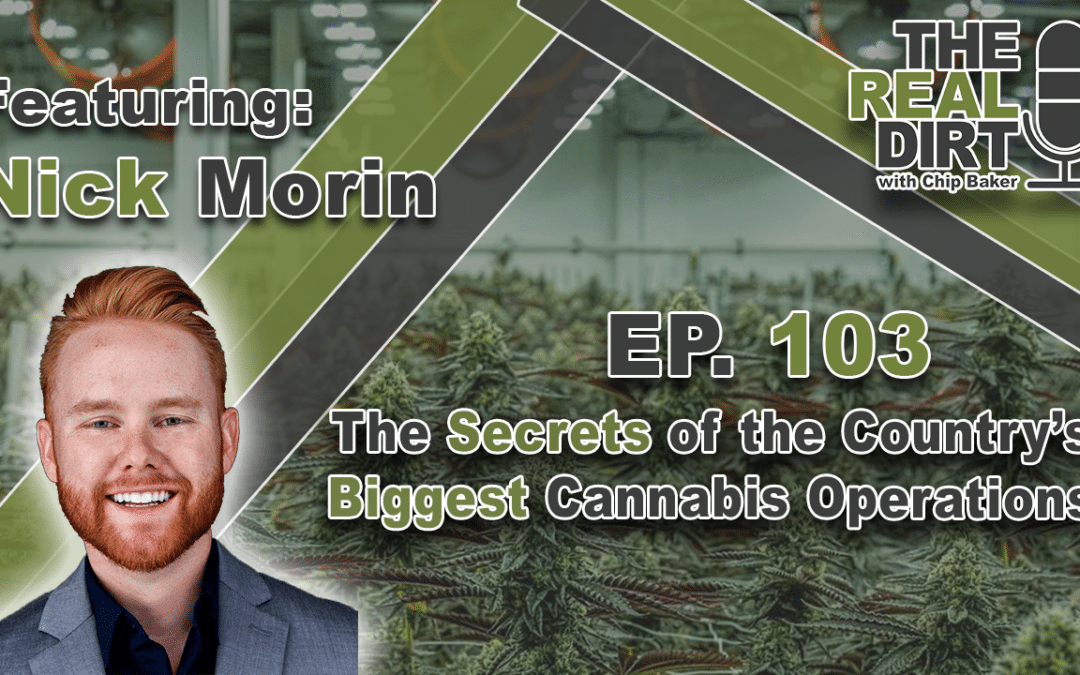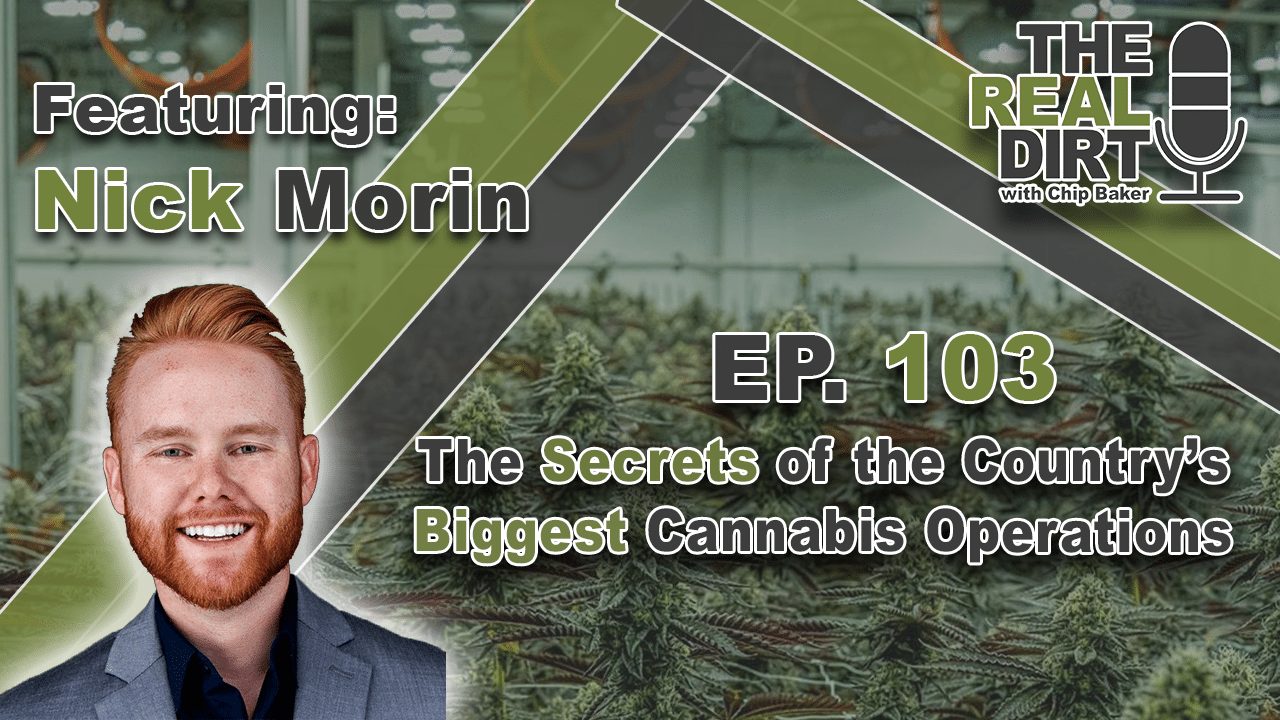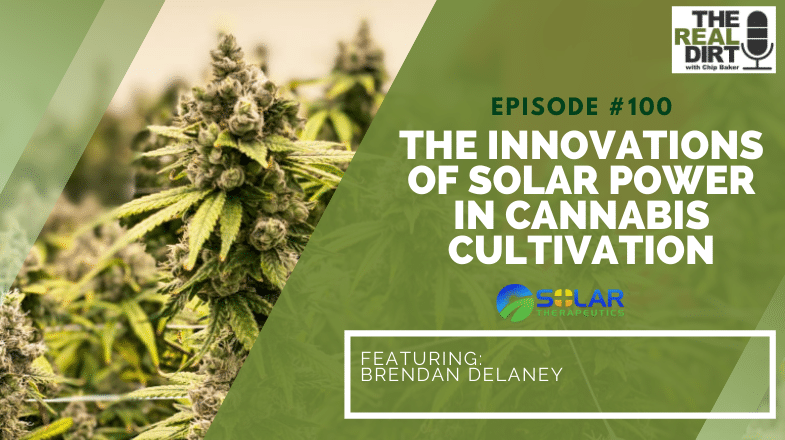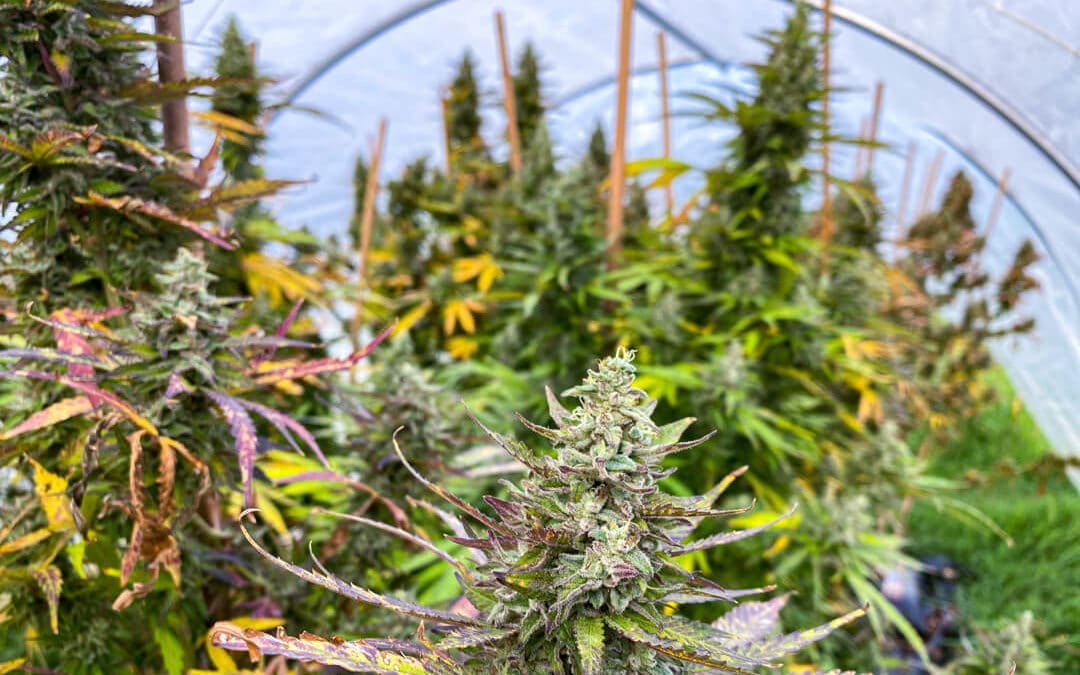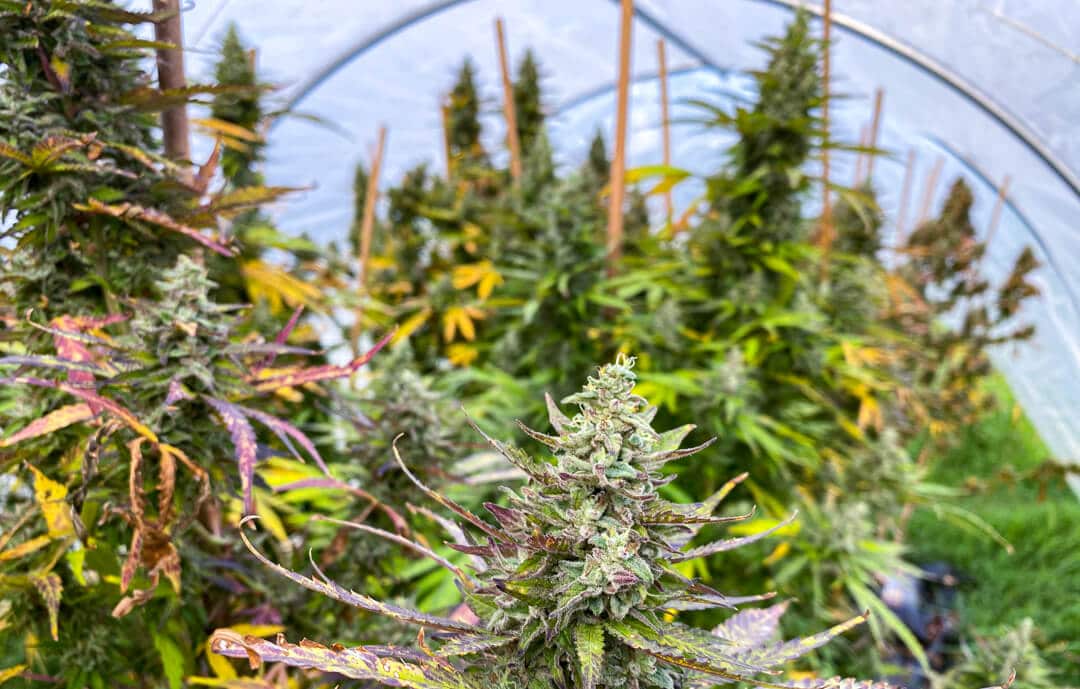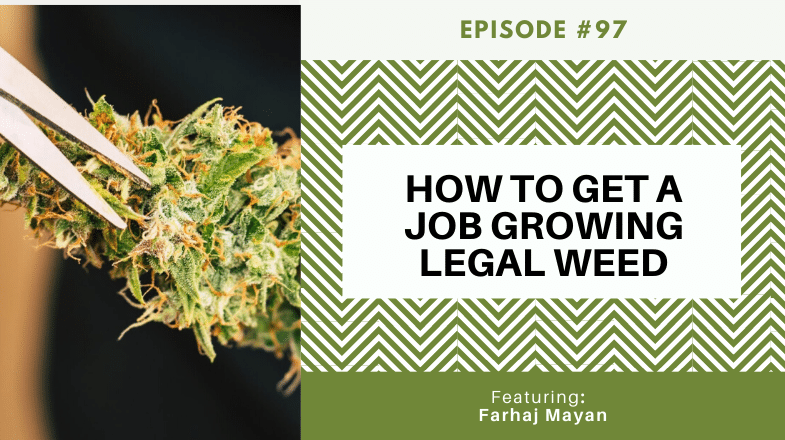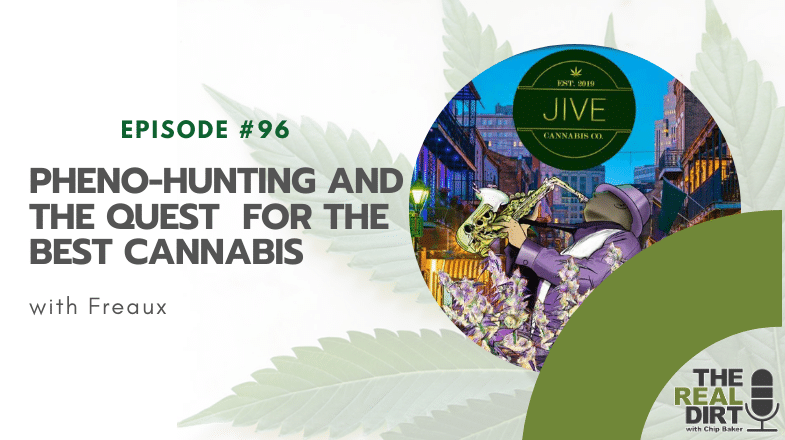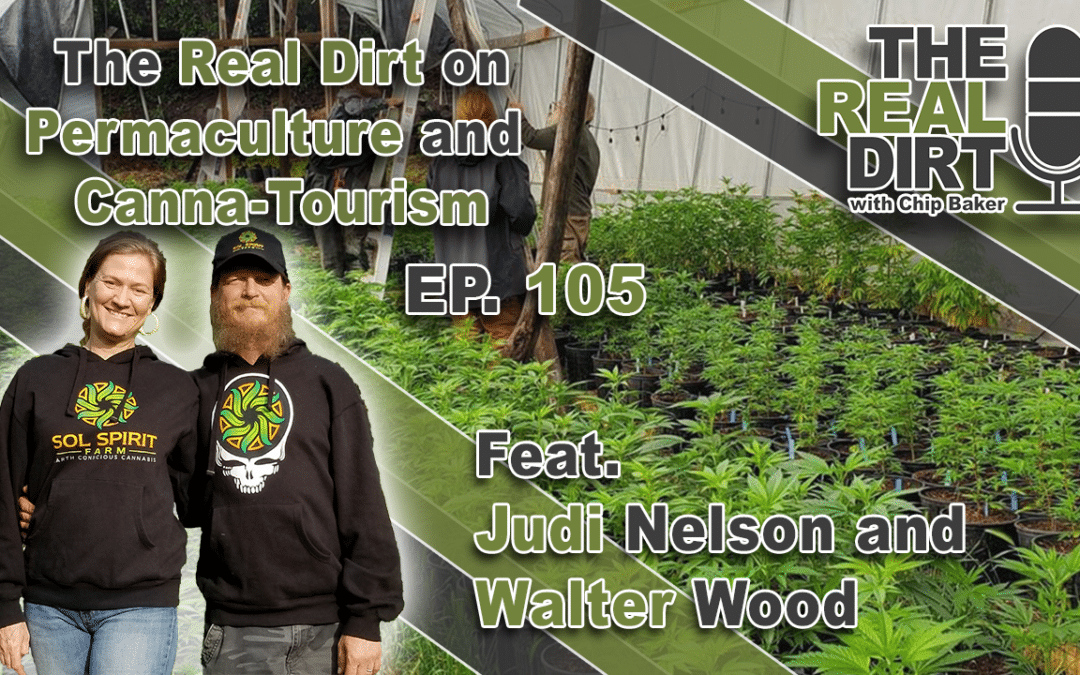
The Real Dirt on Permaculture and Cannabis Tourism
Podcast: Play in new window | Embed
Subscribe: Google Podcasts | Spotify | iHeartRadio | Stitcher | Email | TuneIn | RSS
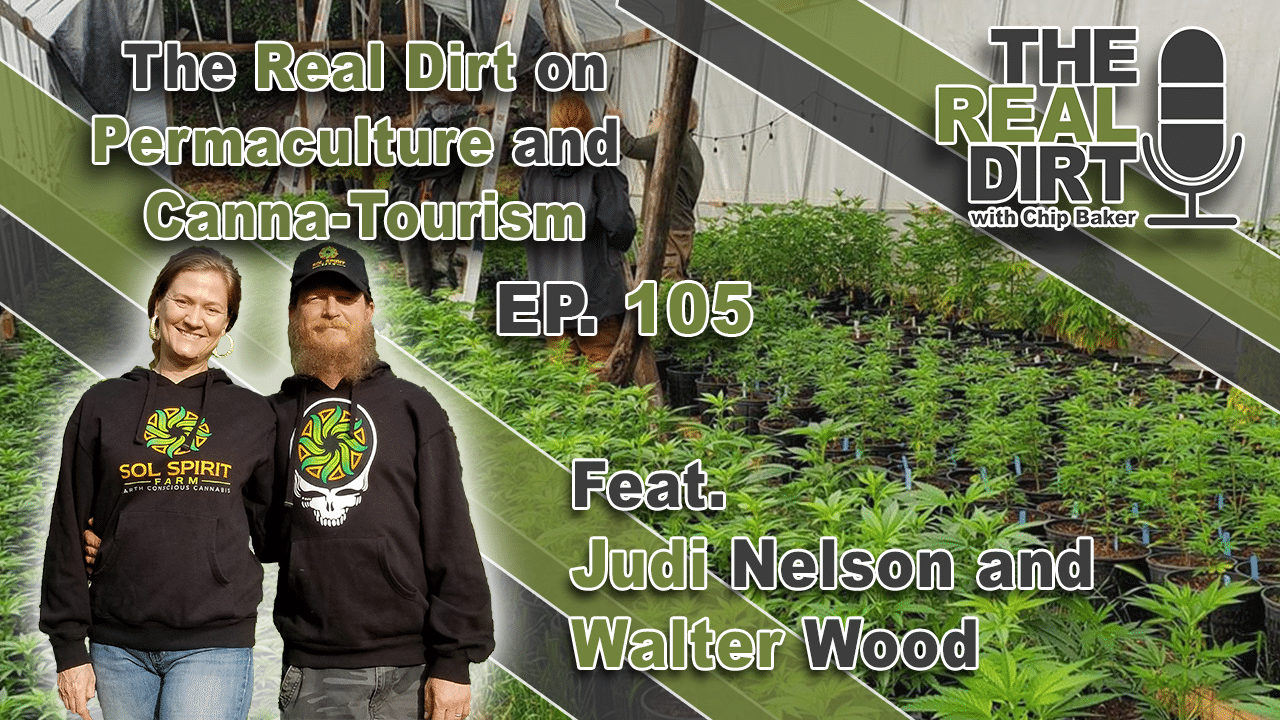
Notice: This episode was recorded before the forest fires in California began.
Restorative agriculture is no joke.
As cannabis cultivators, we are all stewards of the environment. Our actions can directly impact our local ecosystems, and as cannabis cultivation spreads across the nation, that impact can grow rapidly.
Restorative agriculture, or permaculture, is the act of farming while trying to prevent as many environmentally harmful practices as possible. Water usage, nutrients, soil beds, and farm design are just some of the aspects that go into restorative cannabis cultivation, and Sol Spirit Farm is doing it all.
Judi Nelson and Walter Wood are the owners of Sol Spirit Farm, a licensed 10k square foot regenerative cannabis farm in Trinity County, CA and Sol Spirit Retreats, a cannabis tourism-focused, farm stay hospitality business. Walter has been cultivating cannabis since 1996, and his passion for improving the environmental footprint of his cannabis cultivation is what drives every cultivation decision.
Judi and Walter started Sol Spirit Retreats in 2019 after meeting a lot of people, even people working in the cannabis industry, who had never seen a cannabis plant growing in the ground under the full sunshine. They wanted to share the experience of being in the Emerald Triangle on a cannabis farm, and show off how regenerative farming, permaculture principles, and appropriate technology can enhance the cannabis we bring to market, while improving the health of our land.
In this episode of The Real Dirt with Chip Baker, Judi and Walter take Chip through their grow processes and how they maintain their restorative cannabis cultivation practices. They also dive in to the new world of cannabis tourism and the many challenges, especially the legal hurdles, that the two had to overcome just to operate.
While still small and driven mostly by word-of-mouth, Sol Spirit Retreats has drawn in a lot of people trying to experience the northern California life. Judi hopes that one day it will be just like a winery and orchard, where visitors won’t just be able to tour, but also taste the cannabis on the farm!
Check out this episode on our new YouTube channel or go to your favorite podcast platform to listen on the go! TRANSCRIPT BELOW
Connect with Judi and Walter
Sol Spirit Farms
Follow and Subscribe to The Real Dirt Podcast:
Instagram: https://www.instagram.com/therealdirtpodcast/
Facebook: https://www.facebook.com/therealdirtpodcast/
Apple Podcasts: https://podcasts.apple.com/us/podcast/the-real-dirt-with-chip-baker/id1173559750
Spotify: https://open.spotify.com/show/1tC6OyqCJfUWsmGYovqlQP
Get great deals on grow gear:
Instagram: https://www.instagram.com/cultivatecolorado/
Facebook: https://www.facebook.com/cultivatecolorado/
Transcript
Chip: Oh, here we are, The Real Dirt. Today at The Real Dirt, I have some peoples from one of my favorite place in the world, Trinity County, California. Man, Trinity and Humboldt, and along the border there, is one of the most beautiful and rugged places in the world. And I have Judi Nelson and Walter Wood of Sol Spirit Farms and Retreats. Say hey, Judi and Walter.
Walter: Hello!
Judi: Hey, Chip!
Chip: Oh, man, I just love that whole area you guys are in, outside Willow Creek all the way to Hayford. I’ve got some really great friends over there. Little Hill Farms is over there, and man, you guys are just in paradise.
Walter: Definitely, definitely. We love it. We have been out there for about 20 years now and I don’t know, we hardly leave. It’s home. It’s a magic place.
Chip: So are you guys on the mountain, or the river?
Walter : We’re about 300 feet up from the river floor. So we’re just out of the river fog, but at the same time, we’re not up on the hilltop. So it’s a nice kind of in-between. We’re in the valley, but we get about 12 hours of sun so it just works out perfect.
Chip: Oh man, it sounds beautiful. Yeah, that river fog can plague you. I lived over in, off the Vandusen for a number of years. Man, the fog just creep right in on you.
Walter: I had no idea how bad it was until one day, we just took a little drone up and it was like, 10 o’clock in the morning. We’d been in the sun for hours and the whole valley was fogged in just below our shelf.
Chip: Oh yeah, there’s places like that all over. You know I lived in, up in Kneeland right outside Arcata for a number of years. And we’re at the 3500 block, which is 3.5 miles up that hill. And if you went just a half a mile further, you’re gonna have enough fog. Almost every single day like, hours before you know, we got out of the fog.
Walter: Luckily, we were living in the area for a few years before we bought the property, and we had a pretty good idea what the [2:18 inaudible] were. Permaculture course really helped nail in what exactly makes a good piece of property for homesteading, and growing some fine medicines.
Chip: Well, man, you guys are in the homesteading capital of the world, that’s for sure. And you mentioned permaculture, and you know, we talked about regenerative farming earlier. You guys have a unique cannabis business. You know, many people just have a, they cultivate, or extract, or are packaging something, but you have this cultivation that you integrate with a farm stay. Tell me how that works.
Judi: Well, so we have been inviting guests up to the farm. The [2:59 inaudible] as legalization of recreational hemp in California, we started going to a bunch of different trade shows. And it was kind of amazing to meet people who are in the cannabis industry who have never seen a cannabis plant growing in the ground. And it really surprised me, because obviously, we’ve been sort of up in our little bubble here for the past 20 years, and I just didn’t realize it. And so, we just really wanted to be able to bring people like that up, and be like, “Hey, check this out. This is this way that this can be done that’s not taking a lot of resources.” We’re actually trying to make our piece of property and the land that we’re working with in a better state than when we found it. And in order to do that, we have some bell tents, which are these beautiful canvas tents. And people come up, and they generally spend two nights in the tents. And we raise pigs and chickens on the farm, as well as vegetables and fruit, and so we’re able to do farm-to-table meals. And then Walter takes them on a really nice farm tour, and shows them all the different techniques that we’re using. And we usually take them rafting on the Trinity or on the South Fork, depending on what time of year it is. And it’s just been really great, because I think to people who are suffering nature deficit, nature connection deficit, it’s a really rejuvenating experience I think for people. Especially if they’re coming from a city, to come up and just chill out, smoke some good medicine, and connect with nature. And it’s been really rewarding for us too, and hopefully for them.
Chip: That sounds so fun. But you guys don’t have a normal cultivation or I shouldn’t say a normal, but it should be normal. But you guys use permaculture and regenerative farming techniques. Many people have heard organic or maybe living soil, and those are kind of part of regenerative farming and permaculture a bit. And I know it’s a huge question to ask, but man, can you like, tell me how it applies to cannabis?
Walter: Well, we’re working on a whole bunch of different angles and we did this, we have transitioned substantially in the last few years. We were doing the full season plants up until almost legalization, and then we switched over to the light dep, and so we’re getting all that worked out. And so we’ve now got about six and a half thousand square feet of, we got living soil beds which for us that means we don’t till them, we don’t broadfork them or anything. We did originally broadfork them to just loosen them up a little bit, but not to actually turn the soil. There is a living clover cover crop growing year-round, it’s a little bit died back right now, because they were associated out by the ladies on the first round. We just replaced the spot where the plant itself was potted in, or the pot went in into the ground. And so the rest of it’s all connected, all natural, all living. Tilling really disrupts the biology of the soil and releases a lot of CO2 into the air. With this, the clover cover crop, we didn’t have to import any nitrogen this year. All’s we’ve been feeding has been compost fees, most of that’s made with onsite compost, we’ve been doing various KNF type things, which we are importing some sugar to make our nutrients. So that’s just about it. It’s all natural farming, just trying to to make as many nutrients as we can at home to import as little as possible, and just build that soil.
Chip: When you say beds, describe what your beds look like.
Walter: Well, so I mean we are on a little bit of a slope. It’s pretty mellow, but it does slope so we went across that hillside. And when we broadforked it and all that out, we leveled out a six foot bed going across the hillside, it’s tied right into the soil. There’s no cage around it or anything like that, it’s just directly in the earth. And then, we’re going to be putting up some wood edges on the downhill side to just help retain that edge. It’s grown right in the earth. It’s super important to me. We don’t have to feed as much, and the plants have access to what they want. They can make choices, and they’re not stuck in a little tiny soil spot, they have access to the whole area.
Chip: What did you have to do to your soil to prep it? What did you add to it at the beginning, and what are kind of the things that you add to it now?
Walter: Well, so this year, like I said, we actually, we did not add anything besides wood cover crop (7:50). And then we also did bring in forest duff from the hillside above of the patch. And so we brought in a couple inches of the leaf litter and stuff that’s just starting to break down a little bit, so that brought in our indigenous microorganisms or IMOs, as they’re known sometimes. So we covered the beds with a six inch layer of that which completely covered that clover for a little bit, then that cover crop burst right back through that, and basically just incorporated all of that leaf matter right away. And so previously, when we first did prep those beds, we did bring in some manure. I think that was about it. I’m so scared to bring in even from outside anything because our tests, our flower’s tested to the parts per billion on these pesticides, and what if I’m bringing in some straw or something, and if it were to have something? So we avoid bringing in anything. We like to keep everything from on-site, that way we know it’s clean.
Chip: These aren’t like, beds that normal people think of that have wooden sides, their area is that you’ve built in the soil, grown in and added your own ingredients, local ingredients.
Walter: Exactly, exactly.
Chip: When you talk to people about cannabis techniques and grow techniques, a bed means so much different, so many different things. You know, in the indoor world, it can mean something, it’s totally different than the outdoor world.
Walter: We are directly in the ground for sure.
Chip: You’re directly in the ground and you say you do light dep, is it under plastic? Or is it under natural sunlight during the day?
Walter: So yeah, we do not have the clear covers on the greenhouses, so they are open to the natural sunlight. It makes it simpler. We don’t need as many fans, things like that, because it is open. And then yeah, we roll down some tarps over it at night, give us the 12 hour cycle.
Chip: Oh yeah, absolutely, man. I’m just envisioning your garden here as we’re talking about it. I mean, I’ve been in quite a few Humboldt and Trinity Gardens on the hillside. I feel like I know, I feel like I’ve been to your place before.
Walter: One thing that’s a little unusual is each bed is on its own, a foot higher than the next, because it’s sloping down the hillside. So then the bottom of the greenhouse has just some leg extensions to level it out. And so once again, just trying to simplify, keep things as minimal, and environmentally friendly as possible.
Chip: That’s the name of the game. And you know, the interesting thing about everything we’re talking about, is there’s no cost in doing this. Like you virtually have, I mean, you have very low input costs.
Walter: Yeah, comparing it to an indoor scene it is very drastically reduced. I would do only two runs a year. So we have very little lighting, very little inputs, and that way, the light dep is significantly more labor I find than the full season was. And you know, just pruning up all these plants and anything when you multiply it by 1800 or 2400 pound a run, all of a sudden like, just a few [11:13 inaudible] here and there adds up.
Judi: There is an increased labor cost, you know, you’re just trading going out into the forest and having to collect these inputs. That’s a labor cost, right? So you’re trading maybe some increased labor cost on going out and sourcing the nutrients ourselves compared to like, just going to the store and buying something that somebody else made in a bottle. So it’s a little bit of a trade-off. It’s not like there’s no cost associated. There’s no material cost, but there is a labor cost for sure.
Chip: Wait, wait a second. I thought that’s where the farm stay came in. Don’t you have the guests doing that for you?
Judi: I gotta make that work out, right? That’s the next step.
Chip: Sounds like you guys got a great trim camp. You really need to be hustling guests here in October, huh?
Judi: Right. Yes, come pay to trim our weed. That sounds like a great plan. I gotta get to work on that.
Chip: You would be the first person to try to implement that one.
Judi: I’ll let you know how it goes.
Walter: We’ll outdo what everyone else has [12:16 inaudible].
Chip: You know, not too many places have cannatourism, and that’s what we’re talking about here. And this is so akin to, I mean, wine tourism or fishing tourism. Like, this is like, a brand new thing. And how has it been perceived?
Judi: Well, you know, it’s been a little bit of a challenge just working out all the legalities of doing it, obviously because cannabis is so highly regulated. That’s, I would say been the most challenging part, is just trying figure out and make sure I’m not breaking any rules. And one thing that I mean, the people who have found it and have come out, we sort of kept it a little just word of mouth so far, but the people that have come out have all had a great experience. And I think that, especially in Trinity County, and in Humboldt, like, it’s a huge thing if we can make it so that it’s easy for farms to do this, and to show it. There’s a huge demand for people who want to come and have this experience. It’s like, legendary, this area. There’s lots of people that want to come have the experience. So it’s been really well-received by the people who have come so far. We’re just trying to make it better all the time. And someday too, what we hope is like, just like wine, it would be amazing if we can get to the point with the state laws and the local laws that I could actually allow people to purchase cannabis at the farm when they come, you know, be able to buy our flower on our farm. So far that’s not allowed, but I really do hope that one of these days soon, the various involved agencies do allow us to do that, just like you can at a winery. And do tastings, and do that whole thing, because that would be amazing.
Chip: Absolutely man. They’ll treat us like adults one day.
Judi: Someday.
Walter: Maybe, I sure hope so. We know it’s come a long way.
Chip: It’s amazing, you know, Humboldt and Trinity County has such long-standing history, but there’s just always been this fight against cannabis there, and it just still remains. It’s one of the most difficult places to get licensing to this day. They’re really missing out on so much great culture. And this huge brain trust is there of people like yourselves, and living environment, sacrificing to grow cannabis, and cannabis growing them in return. It’s just an untapped resource, and they just haven’t used it well enough, that’s for sure.
Judi: Especially in Trinity where, you know, there was logging and mining, and that’s kind of what everything was built upon. But that’s been gone for decades now. And there’s not a lot else going on in Trinity. And I do think it’s changing. You know, we were able just recently, the Trinity County Agriculture Alliance, of which we are members, which is a group of licensed cultivators in Trinity. And we actually proposed our own cannabis commercial, cannabis tax measure, like, to tax ourselves. Because up to that point, Trinity didn’t have one and, you know, we all want to see our community services happen. And, we were able in five days to collect 10% of the registered voter signatures in the county to get our measure on the ballot. And you know, who would have thought that that would ever happen in Trinity County? But it just did, so it’s coming around, it’s happening. You know, we’re getting more organized, and as people can kind of come out of the closet a little bit, I think that’s only just gonna increase.
Chip: Yeah, ’cause people are still scared to talk about cannabis there, even legal cannabis owners. They’re scared to talk about cannabis. They’re scared to bring it up to their neighbors. It’s still taboo in so many communities, in so many places.
Judi: Yeah, it’s true. I think that for me, that’s been one of the best parts about recreational happening in California. It’s just like, “Okay, you know what? We’re here. We’ve been here the whole time, but now we’re letting you know.”
Chip: So tell me about this tax initiative.
Judi: Well, so there was a tax measure proposed on the March election by a group of people who really actually just wanted to put all of – my perception – was that their tax basically was just to put everybody out of business. And so this, the Trinity County Agricultural Alliance came up with one that is much more small farm friendly, because in Trinity County, almost everybody has 10,000 square feet or less because of the way that the ordinance was written. There’s only a few people who have more than 10,000 square feet. And so basically, the TCAA came up with this proposal where it’s all based on sales, right? So for instance, in Humboldt County, you have this square footage tax where you’re charged per square foot, kind of regardless on whether you grow anything or make any money or not, which personally, I don’t think is the best way to do it.
Chip: Oh, it sucks.
Judi: I think that like these other industries, you should be taxed once you make money, right? And so luckily, we kind of had time to look at all these other counties and be like, “Okay, what’s good, what’s not good?” And so this tax, it’s like, for your first hundred pounds, you’re taxed at this rate. And I can’t quote you the exact numbers, but you’re taxed at a lower rate. So if you’re a very small producer, those first hundred pounds you grow is taxed at a low rate. And then it goes up, like okay, and then the next 200, I think, and it goes up from there until like, over I think a thousand pounds, you’re paying, I believe it’s $15 a pound in cultivation tax to the county, basically. And, you know, there’s some other things in there about different businesses, there is no retail in Trinity County yet at this point. And so they’re not, you know, they’re missing that, again, they’re not collecting any tax revenue because they’re not allowing anybody to sell retail, which hopefully, again, they’re gonna get that together. But this initiative mostly is for taxation on cultivators, because I think that’s appropriate as long as you wait to tax them. Wait until I’ve made some money, I’m very happy to contribute to the county coffers to do roadwork and, public safety, and things like that, and schools. And so, we just wanted to show as an industry like , “Look, here we are, we want to contribute, but don’t try to put us out of business.” Because that’s not going to be good for the county long-term.
Chip: Yeah, there’s so much green greed, it comes from every place. The counties get it for sure, and the state governments get it for sure. Well man, I salute you guys, for working so hard to put it together. Trinity was considered one of the harder places when it all started, I think Humboldt’s shown that it’s the hardest place right now. I mean, Mendocino might not be so easy either, but it hasn’t been any easier anywhere in the Triangle.
Walter: I think the triangle has some like, 60 or 80% of the permit since, it’s a large number.
Chip: More like 15, 16,000 people in Humboldt with commercial grows, you know, before all this has happened. And to say that you have like, and to say that you have 500 people or 600 people with licensing? Man, I just don’t think that’s a good enough attempt to get people out of the private market industry, and get them into tax. Because literally for Humboldt, it’s billions of dollars. They would convert all of that private grow – sorry guys, you should probably pay some taxes, all of my private grow friends that are out there just growing in the hills. I love you guys, you should pay more taxes. If they would incorporate all those guys into it, it would like really, really change. I mean, my local school, Trinidad Union School District, man they’re failing, they don’t have any money, right? Like, COVID’s hit them so hard like, there’s like, just so much stuff, and through Humboldt and Trinity County an educational loan that needs to be worked on. And you know if they played their cards right, like, cannabis could totally bring the whole Emerald Triangle out of all of their problems, right? It could help with the fire suppression issues. It could help with all the drug problems, it can help with all the homelessness, it can help with all of the educational stuff. I mean, it’s just such a wasted resource. It’s just kind of frustrating when we see as there.
Judi: Yeah, I think some of that is not necessarily seeing the legal market in California. And it is a challenge right now to, when you compare just all the hoops you have to jump through, all the money you have to pay. And yet, I personally think, because the state especially is taxing the end product so hard, they just have this huge black market that’s still going, and it’s hard to not look at that and be like, “Wow, that was so much easier back in the day.” But again, now it’s all changing and it’s the time to like, get together and move forward into the light.
Chip: No, it’s the responsible thing to do. And I mean, I don’t know about Trinity County, but Humboldt County per capita always had more people contributing to fundraising than anyplace else, you know? And that was because all the cash dollars from the fishing, the logging and the cannabis. And now the fishing and the logging, it’s like next to nothing compared to what it used to be, and it’s just cannabis. If they could just, open up their arms, just embrace it.
Walter: Relax a bit.
Chip: Yeah, relax, relax a bit. I know you have such a special place and inviting people out there. Tell me about some of the people that have come in and visited you.
Judi: So last year, we mostly focused on some different folks who either own, or manage, or the buyers for various retail shops in California. Again, because there’s no better way for someone to learn where this particular brand, our Sol Spirit brand of flower comes from. And, the lot of them had never been to the Emerald Triangle. So last year, it was a lot of retailers. And most of them were so stressed out when they arrived, because they’re jumping through their own set of hoops. And that job, I can’t even imagine trying to pull that off. And so, it was just super relaxing and rejuvenating for them. And most of them, you could just like, see their faces change by the third day where they were just like, “Oh, okay, we’ve let go of the stress. We’re here. ” And also getting to see the way that we farm, I think really opened their eyes to like, it’s not all the same. So like, indoor has its thing and then people with like, really large grows who are maybe putting out more mid-quality stuff, but in volume, that’s a whole different thing. And then our particular craft, regenerative way of doing it, it’s like, you’re actually talking kind of about different products, right? And so I think it was great for them to be able to see, like, “Oh, yeah, the next time somebody comes in and tries to sell me a regenerative craft cannabis, I’m not going to compare it to this $8 eighth in a mylar bag that came from a 12-acre scene in Salinas,” or something, you know. So that I think is like, an education piece that’s super important to us. And so there’s that, and like, that really, I think, changed a lot of their perspectives. And then this year, we’ve had more just regular folks. It’s been interesting with COVID to kind of work that all out, and so we had a bit of a slow start just making sure that we could keep everybody safe. And now I feel like we’ve got that down. And it’s been, I feel like even more rewarding, because we’ve had several people from the Bay Area come up, and some of them have been stuck in their apartment for months. So to be able to come out and of course, the beautiful cannabis medicine also helps with their mindset. And we had a couple of people come out where they sort of like, changed their whole life trajectory over the weekend, because they were able to just kind of step out of their normal life and gain some perspective on what they were doing which of course the cannabis is also really helpful for.
Walter: Yeah. The hills of Humboldt County and Trinity County have a way of doing that.
Judi: It’s been really great. We’ve had all kinds of different people, yes. Yeah. You know, you get used to where you live, and you kind of stop seeing it, I think sometimes. And being able to have all these different people come and see it from their perspective and out of their eyes, it really refreshes our love of the place as well.
Chip: Oh man, you know that’s the thing that people don’t understand or know about that area, Northern California is it has the least light pollution I’m pretty sure of any place else in the US. Right, maybe even the continental US. I mean, it is you get to see this guy.
Judi: Yeah, it’s pretty amazing.
Chip: It’s been great chatting with you guys. If people want to come to Sol Spirit Retreats, how do they get in touch with you guys? Can they follow you on Instagram? Or how does it work?
Judi: Well, they can follow us on Instagram. We have two different Instagrams, so one for the farm and one for the farm stay. And they’re, Sol Spirit Farm, s-o – like the sun, Sol Spirit Farm and Sol Spirit Retreats. And then our websites are the same, solspiritfarm.com and solspiritretreats.com.
Chip: Yeah, well, hey, thanks for joining me and man, smell some of that good Trinity County here for me. God, I wish I was there right now with you.

